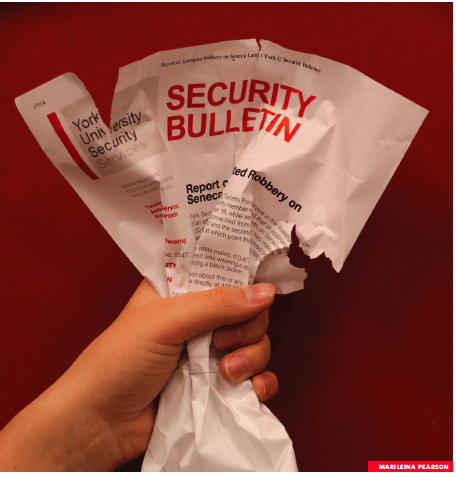
A robbery and a medical emergency were faked in December by students in order to avoid taking exams, according to Toronto Police.
The university posted a security bulletin on December 20 regarding a reported attempted robbery, which had been reported to police on December 19.
The bulletin described a female victim being approached outside of the TEL Building by two males, who allegedly wrestled her to the ground and kicked her. The suspects fled after a passerby yelled at them, said the bulletin.
Police soon discovered the incident hadn’t occurred and the bulletin was retracted by the evening of December 20.
Detective Sergeant Al Coulter says it was evident during the investigation that there was something strange about the incident.
“Well, we obviously investigated and interviewed [the victim], and through the interview process, we were able to determine that certain things weren’t adding up,” says Coulter. “They eventually said no, I have a problem and the robbery didn’t happen.”
In a second incident, a student called on December 6 for medical assistance following a robbery, which was also soon discovered to be fake.
When police probed the student about the robbery, she admitted that nothing had actually happened and that she faked the incident in order to avoid an exam.
“It was a hoax to get out of an exam, but they broke down and told us it didn’t really happen, and I guess they got nervous when the police came,” says Coulter.
Police, upon realizing that both students faked an exam, decided not to press charges and instead reported what happened to the university.
 Coulter says police are happy the investigation is over and will not be laying any public mischief charges on the students.
Coulter says police are happy the investigation is over and will not be laying any public mischief charges on the students.
“It’s not really beneficial to us to lay any public mischief charges, although we do consider that under the circumstances,” says Coulter.
“We usually do, but I think in these cases, if this person needs help, we let York council decide on any action they want to take.”
Public mischief includes reporting that an offence has been committed when it has not been committed, with a potential sentence of up to five years in prison.
Joanne Rider of York media says in situations like these, the Office of Student Conflict Resolution (OSCR) assesses and evaluates each infraction on a case by case basis, according to the Code of Student Rights and Responsibilities.
“Following a review, a decision is taken about the appropriate next steps, which may include referrals to provide support, the signing of a memorandum of understanding and/or disciplinary action,” says Rider.
Although only two incidents have been recorded this exam period by Toronto Police, Coulter says this may be a result of York’s diligence in ensuring that exam disruptions don’t occur due to a lack of preventative security measures.
York now has overnight security officers guarding the Rexall Centre ahead of time, making false fire alarms and bomb threats impossible, according to Coulter.
“So it’s stress. People are thinking, ‘How do I get out of this?’ and they pull a fake robbery,” he says.
The university, which first started using the Rexall Centre for exams in 2011, hasn’t experienced any disruptions in exams held there for the last two exam periods. This December, 345 exams were held in the Rexall Centre, which is 30 per cent of all exams taken.
Coulter says stress could have been a factor in the actions of both of the students in these incidents.
Rider says the university offers a number of support services such as study groups, access to tutors, or supplementary instructions for students who may be experiencing stress or academic difficulty. She adds that students should seek help if they are having any problems.
“Counselling and Disability Services offers regular workshops on managing stress and the Learning Commons provides a variety of workshops year round on effective study skills and time management,” says Rider. “Seeking help throughout the term, rather than allowing stress to build up to the final exam, is the best course of action.”
Hamid Adem
News Editor




